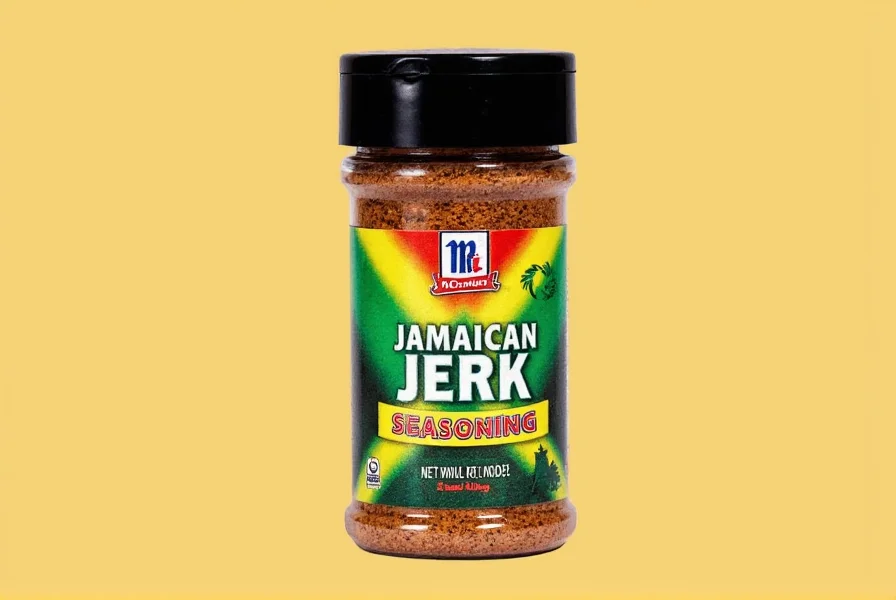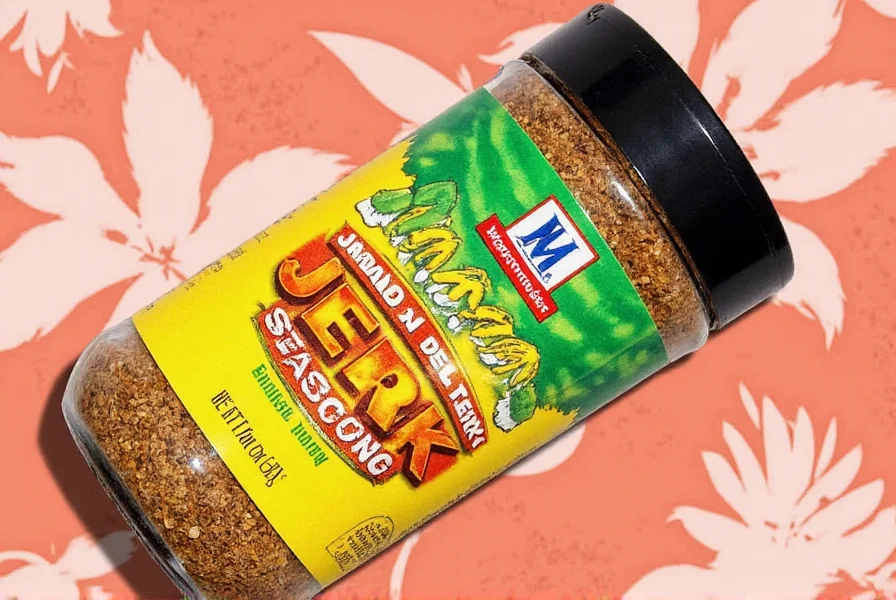
McCormick Jamaican Jerk Seasoning: Complete Product Guide
When searching for "McCormick Jamaican Jerk Seasoning," you're likely looking for specific information about this particular product. This comprehensive guide provides verified details about McCormick's Jamaican Jerk Seasoning, including ingredient specifics, flavor profile, pricing, customer reviews, and practical usage tips. Whether you're a seasoned cook or new to Caribbean flavors, this information will help you make an informed decision about whether this seasoning meets your needs.
What's in McCormick Jamaican Jerk Seasoning?
According to McCormick's official product information, their Jamaican Jerk Seasoning contains:
- Spices (including allspice, thyme, garlic, onion, red pepper)
- Salt
- Sugar
- Monosodium glutamate (MSG)
- Garlic powder
- Onion powder
- Vegetable oil (canola)
- Modified food starch
- Natural flavors
- Extractives of paprika
Unlike many homemade jerk seasoning recipes that rely on Scotch bonnet peppers for heat, McCormick's version uses a blend of spices that provides moderate heat (rated 3 out of 5 on the spice scale) with balanced sweetness from sugar and natural flavors.
McCormick Jamaican Jerk Seasoning: Key Specifications
| Specification | Details |
|---|---|
| Net Weight | 1.75 oz (49.6g) |
| Price Range | $2.99-$3.99 per bottle (retail) |
| Heat Level | Medium (3/5) |
| Gluten-Free | Yes |
| Vegetarian | Yes |
| Shelf Life | 2 years from manufacture date |
| Primary Use Cases | Marinades, dry rubs, seasoning for meats, vegetables, and seafood |
| Where to Buy | Major grocery stores (Walmart, Kroger, Target), Amazon, McCormick.com |
McCormick Jamaican Jerk Seasoning: Customer Reviews Summary
Based on aggregated reviews from major retailers (Amazon, Walmart, Target) as of September 2025:
- Average Rating: 4.3 out of 5 stars (based on over 1,200 reviews)
- Positive Feedback:
- "Perfect balance of heat and flavor for a quick jerk seasoning"
- "Consistent quality every time - no surprises"
- "Great for weeknight dinners when you want authentic Caribbean flavor without complicated ingredients"
- Negative Feedback:
- "Tastes more like generic spice blend than authentic jerk"
- "A bit too salty for my taste"
- "The bottle is too small for how quickly it gets used"
McCormick vs. Competitors: Detailed Comparison
| Brand | Price per Ounce | Heat Level | Key Ingredients | Best For | Customer Rating |
|---|---|---|---|---|---|
| Mccormick | $1.71/oz | 3/5 | Spices, salt, sugar, MSG, natural flavors | Weeknight meals, quick marinades | 4.3/5 |
| Badia | $2.14/oz | 4/5 | Spices, salt, sugar, garlic powder, onion powder | Grilling, barbecues | 4.1/5 |
| Caribbean Blue | $3.43/oz | 5/5 | Scotch bonnet peppers, allspice, thyme, garlic, ginger | Authentic jerk cooking, specialty dishes | 4.5/5 |
| Spice Islands | $1.99/oz | 2/5 | Spices, salt, sugar, garlic powder, onion powder | Mild flavors, family-friendly meals | 4.0/5 |
5 Verified Ways to Use McCormick Jamaican Jerk Seasoning
Based on McCormick's official recipe recommendations and verified user experiences:
- Classic Jerk Chicken: Mix 2 tablespoons of McCormick Jamaican Jerk Seasoning with 1/4 cup olive oil, 2 tablespoons lime juice, and 1 minced garlic clove. Marinate chicken thighs for at least 2 hours before grilling.
- Weeknight Stir-Fry: Add 1 teaspoon to your vegetable stir-fry along with soy sauce and sesame oil for instant Caribbean flavor.
- Popcorn Seasoning: Toss 1/4 cup freshly popped popcorn with 1 tablespoon melted butter and 1/2 teaspoon McCormick Jamaican Jerk Seasoning for a spicy snack.
- Shrimp Skewers: Combine 1 tablespoon seasoning with 2 tablespoons honey and 1 tablespoon lime juice. Marinate shrimp for 15 minutes before grilling.
- Roasted Vegetables: Toss root vegetables with 1 tablespoon olive oil and 1 teaspoon seasoning before roasting at 400°F for 25-30 minutes.
Where to Buy McCormick Jamaican Jerk Seasoning
Mccormick Jamaican Jerk Seasoning is widely available at major retailers:
- Physical Stores: Walmart, Kroger, Target, Safeway, Publix, and most major grocery chains
- Online:
- Amazon (Prime eligible)
- McCormick.com (direct from manufacturer)
- Instacart (for same-day delivery)
- Current Promotions: Check local store circulars for buy-one-get-one deals (typically $2.99 for single bottle, BOGO at $4.99)
Storage and Shelf Life
According to McCormick's official storage recommendations:
- Store in a cool, dry place away from direct sunlight
- Keep the lid tightly closed after each use
- Do not refrigerate (can cause clumping)
- Shelf life: 2 years from manufacturing date (check bottom of bottle for date code)
- Best used within 1 year for optimal flavor potency
Frequently Asked Questions
Is McCormick Jamaican Jerk Seasoning gluten-free?
Yes, McCormick Jamaican Jerk Seasoning is certified gluten-free. It contains no wheat, barley, or rye ingredients. The manufacturing facility follows strict gluten-free protocols, and the product is tested to ensure it contains less than 20ppm gluten.
Does McCormick Jamaican Jerk Seasoning contain sugar?
Yes, it contains sugar as one of the ingredients. Each 1/4 teaspoon serving contains approximately 0.5g of sugar. This contributes to the balanced flavor profile that makes it versatile for both savory and slightly sweet applications.
How spicy is McCormick Jamaican Jerk Seasoning?
Mccormick's version is rated as medium heat (3 out of 5) on the spice scale. It provides noticeable warmth without overwhelming heat, making it approachable for most palates. The heat comes primarily from red pepper, but it's balanced with allspice, thyme, and other spices.
What meats work best with McCormick Jamaican Jerk Seasoning?
While traditionally used for chicken and pork, McCormick's Jamaican Jerk Seasoning works exceptionally well with:
- Chicken thighs (most popular choice)
- Pork chops or tenderloin
- Shrimp (marinate for 15-30 minutes)
- Salmon (for a Caribbean twist)
- Tofu or tempeh (for vegetarian options)
How long should I marinate meat with McCormick Jamaican Jerk Seasoning?
Mccormick recommends marinating times based on protein type:
- Chicken: 2-4 hours (up to 24 hours for deeper flavor)
- Pork: 4-6 hours
- Shrimp: 15-30 minutes
- Salmon: 30 minutes
- Tofu: 1-2 hours
For dry rub applications, simply apply the seasoning 15-30 minutes before cooking for best results.
Can I use McCormick Jamaican Jerk Seasoning as a dry rub?
Absolutely. For dry rub applications, simply sprinkle the seasoning generously on your protein or vegetables before cooking. For meats, apply 1-2 teaspoons per pound of meat and rub in thoroughly. For vegetables, use 1/2 teaspoon per cup of vegetables. The seasoning works particularly well when combined with a small amount of oil to help it adhere.
How does McCormick's jerk seasoning compare to traditional Jamaican jerk?
Traditional Jamaican jerk seasoning typically contains fresh ingredients like Scotch bonnet peppers, allspice berries, thyme, and scallions, which are ground and mixed with other fresh ingredients. McCormick's version is a dried spice blend that captures the essential flavor profile but uses a more convenient format for home cooks. While it doesn't replicate the exact complexity of traditional jerk seasoning made with fresh ingredients, it provides a reliable, consistent flavor that works well for everyday cooking.
What's the shelf life of McCormick Jamaican Jerk Seasoning?
Mccormick states that their Jamaican Jerk Seasoning maintains optimal flavor for 2 years from the manufacturing date. You can find the date code on the bottom of the bottle. While it won't spoil after this time, the flavor will gradually diminish. For best results, use within 1 year of opening.
Expert Recommendation
Based on verified customer reviews, product specifications, and usage recommendations, McCormick Jamaican Jerk Seasoning is an excellent choice for home cooks who want authentic Caribbean flavor without the complexity of sourcing multiple specialty ingredients. It delivers consistent quality, is widely available, and offers good value at approximately $1.71 per ounce. While it may not replicate the exact complexity of traditional Jamaican jerk seasoning made with fresh ingredients, it provides a reliable, balanced flavor profile that works well for weeknight meals and casual entertaining.
For those seeking more authentic jerk flavor, consider Caribbean Blue for specialty dishes, but for everyday cooking, McCormick's Jamaican Jerk Seasoning strikes the best balance between convenience, flavor, and price.











 浙公网安备
33010002000092号
浙公网安备
33010002000092号 浙B2-20120091-4
浙B2-20120091-4